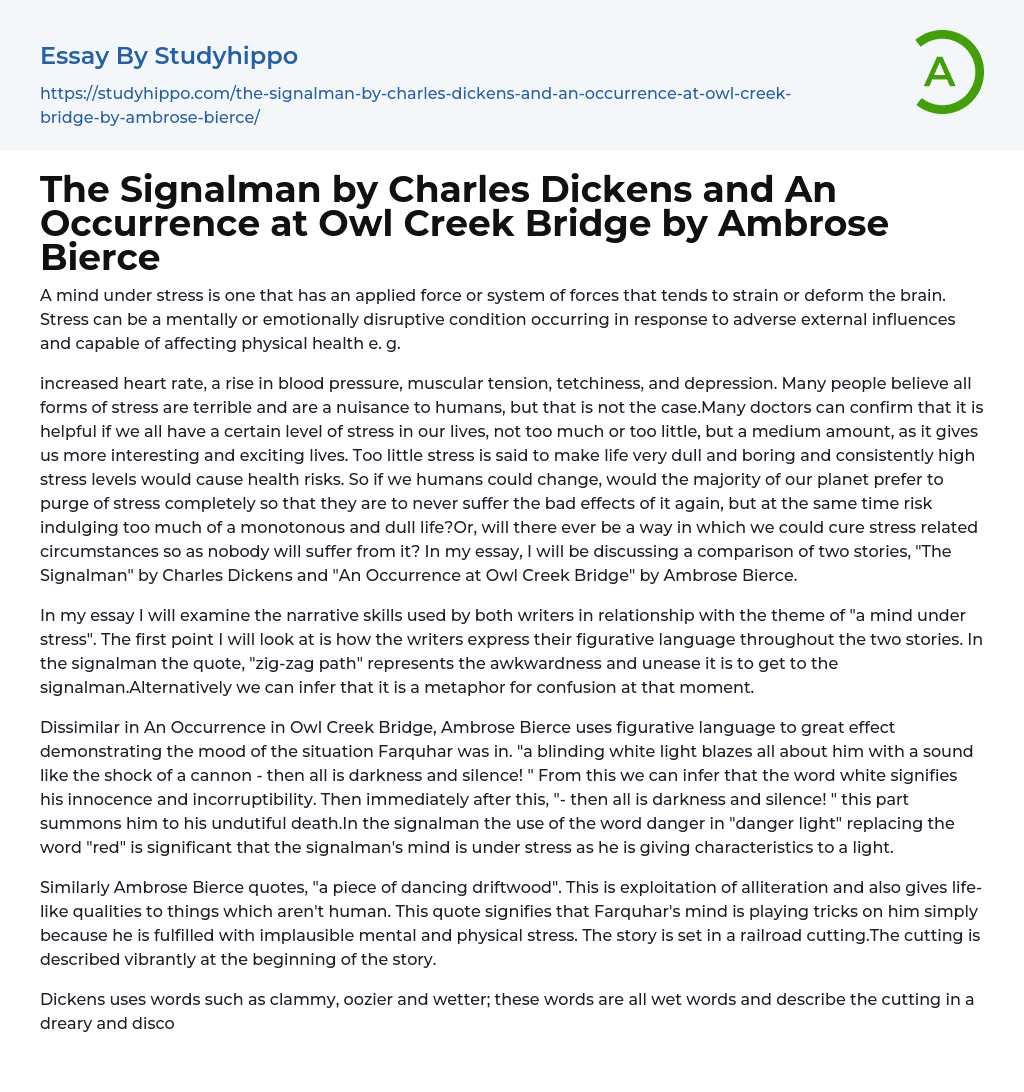A mind under stress is one that has an applied force or system of forces that tends to strain or deform the brain. Stress can be a mentally or emotionally disruptive condition occurring in response to adverse external influences and capable of affecting physical health e. g.
increased heart rate, a rise in blood pressure, muscular tension, tetchiness, and depression. Many people believe all forms of stress are terrible and are a nuisance to humans, but that is not the case.Many doctors can confirm that it is helpful if we all have a certain level of stress in our lives, not too much or too little, but a medium amount, as it gives us more interesting and exciting lives. Too little stress is said to make life very dull and boring and consistently high stress
...levels would cause health risks. So if we humans could change, would the majority of our planet prefer to purge of stress completely so that they are to never suffer the bad effects of it again, but at the same time risk indulging too much of a monotonous and dull life?Or, will there ever be a way in which we could cure stress related circumstances so as nobody will suffer from it? In my essay, I will be discussing a comparison of two stories, "The Signalman" by Charles Dickens and "An Occurrence at Owl Creek Bridge" by Ambrose Bierce.
In my essay I will examine the narrative skills used by both writers in relationship with the theme of "a mind under stress". The first point I will look at is how the writers express their figurative language throughout the two
stories. In the signalman the quote, "zig-zag path" represents the awkwardness and unease it is to get to the signalman.Alternatively we can infer that it is a metaphor for confusion at that moment.
Dissimilar in An Occurrence in Owl Creek Bridge, Ambrose Bierce uses figurative language to great effect demonstrating the mood of the situation Farquhar was in. "a blinding white light blazes all about him with a sound like the shock of a cannon - then all is darkness and silence! " From this we can infer that the word white signifies his innocence and incorruptibility. Then immediately after this, "- then all is darkness and silence! " this part summons him to his undutiful death.In the signalman the use of the word danger in "danger light" replacing the word "red" is significant that the signalman's mind is under stress as he is giving characteristics to a light.
Similarly Ambrose Bierce quotes, "a piece of dancing driftwood". This is exploitation of alliteration and also gives life-like qualities to things which aren't human. This quote signifies that Farquhar's mind is playing tricks on him simply because he is fulfilled with implausible mental and physical stress. The story is set in a railroad cutting.The cutting is described vibrantly at the beginning of the story.
Dickens uses words such as clammy, oozier and wetter; these words are all wet words and describe the cutting in a dreary and discouraging way, persuading the reader to feel anxious about the setting. The word oozier is onomatopoeic, and this adds an atypical sense. The line "a dripping wet wall of jagged stone, excluding all view but a strip of sky"
is used to make the Signalman appear as if he has been incarcerated in his job. It describes the setting in a dull and degrading way.
Charles Dickens also uses lots of dark words such as "solitary", this shows that the Signalman must be lonely. The word "dungeon" again vividly depicts his imprisonment by his job. Also the words "deadly, depressing and foreboding" are used to make the setting seem treacherous, and so the reader feels uncomfortable about the narrator being there. The word "deadly" is dramatic and overpowering; it creates a more apprehensive atmosphere.
In conclusion to my comparative study, I have learnt a lot about the writers' thoughts and possible feelings towards the theme of death.From my evaluations, I can interpret that Robert Frost believes death can seem to be a happy exit for some people and possibly an easy way. Also, when he has gone through frustrating times in his life he has contemplated suicide. On the other hand Seamus Heaney's feelings are significantly different to Robert Frost's. In "Mid Term Break", Seamus Heaney concentrates more on the fact that death can hit anyone at anytime and at any place in the most unthinkable moments of life.
Therefore, he thinks that death is only to lead to negative effects and influence more problems among other human beings.
- Anatomy and Physiology essays
- Addiction essays
- Biodegradation essays
- Dental Care essays
- Disease essays
- Disorders essays
- Health Care essays
- Intelligence Quotient essays
- Nutrition essays
- Olfaction essays
- Public Health essays
- Women's Health essays
- World health organization essays
- Cancer essays
- Infectious Disease essays
- Lung Cancer essays
- Neurology essays
- Physical Exercise essays
- Medicine essays
- Sex essays
- Inquiry essays
- Disability essays
- Poison essays
- Action Potential essays
- Nervous System essays
- Childbirth essays
- Puberty essays
- Blood essays
- Kidney essays
- Neuron essays
- Body essays
- Glucose essays
- Sense essays
- Heart essays
- Skeleton essays
- Human Physiology essays
- Eye essays
- Immune System essays
- Muscle essays
- Skin essays
- Brain essays
- Central Nervous System essays
- Human Skin Color essays
- Digestive System essays
- Common sense essays
- Respiration essays
- alcoholism essays
- Smoking essays
- Casino essays
- Tobacco essays




